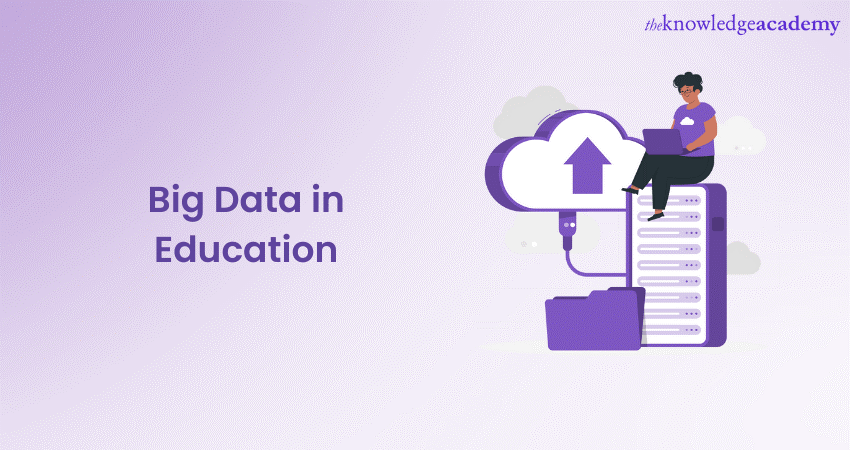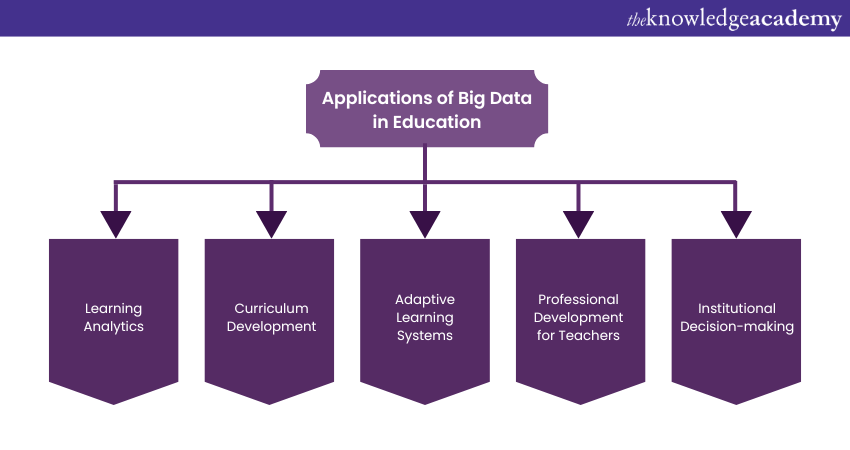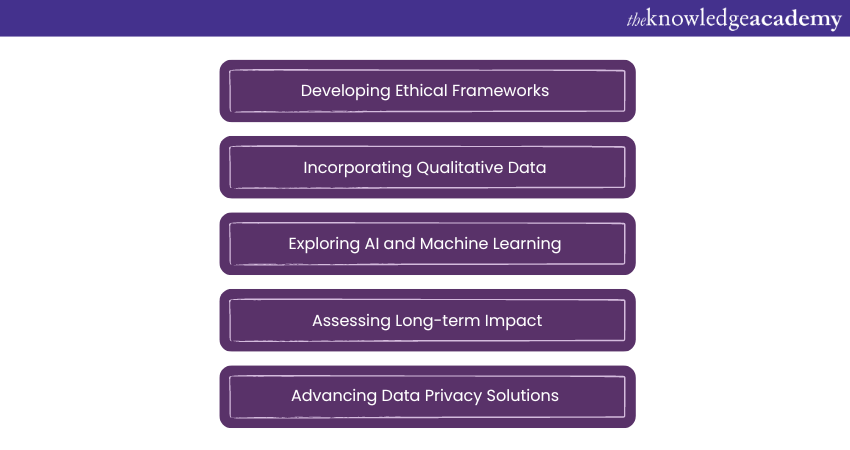We may not have the course you’re looking for. If you enquire or give us a call on 800600725 and speak to our training experts, we may still be able to help with your training requirements.
Training Outcomes Within Your Budget!
We ensure quality, budget-alignment, and timely delivery by our expert instructors.

Imagine a classroom where each student’s learning journey is personalised, where educators can predict and address their needs even before they raise their hands. This is the power of Big Data in Education. Big Data in Education is revolutionising the way we approach teaching and learning. However, with great power comes great responsibility. So, have you ever wondered what the limitations and challenges of implementing this in education?
In this blog, we will discuss the varied applications of Big Data in institutional settings. You will also get a clear view of how institutions can ensure the privacy of student data. Read more to comprehend the future scope of Big Data in Education and discover how this transformative tool can shape the future of education.
Table of Contents
1) What is Big Data in Education?
2) Features of Big Data in Education
3) Applications of Big Data in Education
4) Challenges of Big Data in Education
5) Benefits of Big Data in Education
6) Future Scope of Big Data in Education
7) Conclusion
What is Big Data in Education?
Big Data in Education involves collecting, processing, and analysing vast datasets generated by educational institutions. These include student demographics, academic performance, attendance, online interactions, and assessment results. Key characteristics of Big Data in Education are volume (large amounts of data), velocity (rapid data creation), and variety (diverse data types).
Beyond data collection, Big Data focuses on advanced analytics and data mining to uncover patterns and trends. These insights support data-driven decision-making, helping institutions tailor teaching methods, identify at-risk students, and improve learning experiences.
Features of Big Data in Education
Big Data is revolutionising education by providing innovative solutions to enhance educational outcomes:
a) Data-driven Instruction: Big Data allows educators to analyse vast datasets of student performance, enabling them to adapt teaching methods, materials, and approaches to meet individual learning needs. This personalisation enhances the effectiveness of instruction.
b) Predictive Analytics for Student Success: Utilising historical Big Data and Machine Learning algorithms, predictive analytics identifies students who may be at risk of underperformance or dropping out. Institutions can then intervene early, offering tailored support to boost student success rates.
c) Personalised Learning: Big Data enables the customisation of learning experiences for each student. By analysing learning behaviour and preferences, educational platforms can offer tailored content, exercises, and resources, catering to individual learning styles and speeds.
d) Curriculum Enhancement: Educational institutions can refine their curricula based on data-driven insights. By identifying which subjects or topics students struggle with the most, educators can make targeted improvements to enhance the overall quality of education.
e) Educational Research and Policy-making: Researchers can harness Big Data to investigate educational trends, assess the effectiveness of teaching methods, and inform policymaking. The wealth of data available allows for evidence-based decisions at institutional and governmental levels.
Applications of Big Data in Education
The applications of Big Data in Education extends far beyond data collection; it involves practical implementation that positively impacts various facets of the educational process. The following are some of its common applications:

1) Learning Analytics
Learning analytics leverages Big Data to monitor and assess student progress in real time. By tracking metrics such as time spent on course materials, quiz scores, and engagement with online resources, educators gain a holistic view of students’ learning behaviour.
This data-driven approach enables educators to tailor their teaching methods and interventions, ensuring that students receive the support they need to succeed. Furthermore, learning analytics can identify early warning signs of academic struggles, enabling proactive interventions to prevent students from falling behind.
Sign up for our Big Data Architecture Training today and lead the future of data-driven solutions.
2) Curriculum Development
Big Data Database plays a necessary role in shaping curriculum development. Through the analysis of extensive datasets, educational institutions can gain insights into student performance and comprehension. This information informs decisions about curriculum adjustments, helping educators focus on areas where students may need more support or enrichment. It promotes a dynamic and responsive curriculum that evolves based on evidence rather than assumptions.
Adaptive Learning Systems
Adaptive learning systems harness the power of Big Data to create personalised learning experiences for each student. These systems utilise complex algorithms to analyse student performance data and adapt the difficulty and pacing of content accordingly.
As students progress, the system continually adjusts to their strengths and weaknesses, ensuring that they receive a challenging yet manageable education. This level of personalisation fosters more effective learning and improved retention rates.
Professional Development for Teachers
Big Data doesn't only benefit students; it also provides valuable insights for educators. Through data-driven feedback and analysis, teachers can refine their instructional strategies. For example, they can identify which teaching methods are most effective for different student groups or pinpoint areas where additional professional development may be beneficial. This continual improvement loop enhances the overall quality of education.
Institutional Decision-making
Educational institutions are complex organisations with numerous resource allocation decisions to make. Big Data Integration offers a valuable tool for guiding these decisions. By analysing data on enrollment trends, student performance, and demographic shifts, institutions can make informed choices about staffing, infrastructure investments, and strategic planning. Incorporating Big Data into education not only enhances the learning experience but also empowers educators, institutions, and policymakers to make informed decisions that ultimately benefit students and improve the efficiency of the education system.
Supercharge your career with our Data Science Analytics Course – join us and master data-driven insights!
Challenges of Big Data in Education
While Big Data in Education holds significant promise, it is essential to recognise the limitations and challenges associated with its implementation and use. Understanding these limitations is crucial for responsible and effective utilisation of educational data.
Data Privacy and Security
The collection and utilisation of extensive student data raise pressing privacy and security concerns. Balancing data access with protection is paramount in the educational context. Educators must address the following challenges:
a) Privacy Concerns: The extensive collection of student data raises privacy concerns. Consistently safeguarding sensitive information and ensuring its ethical use is an ongoing challenge.
b) Security Risks: To maintain the integrity and confidentiality of student and institutional data, educational institutions must safeguard against cyber attacks and data breaches.
Overemphasis on Quantitative Data
Focusing primarily on quantitative data can unintentionally neglect the broader aspects of education, such as critical thinking and emotional development, which are challenging to quantify but equally crucial. Educators must consider the following aspects:
a) Quantitative Bias: The emphasis on quantitative data may overlook qualitative aspects of education, such as critical thinking, creativity, and socio-emotional development. These aspects are challenging to measure and analyse using traditional Big Data methods.
b) Holistic Assessment: The exclusive focus on quantitative data can lead to a narrow view of student performance, potentially missing critical indicators of success or challenges.
Lack of Data Literacy
Ensuring that educational staff and students possess adequate data literacy skills is essential to harness Big Data's potential effectively. Educators must consider the following aspects:
a) Educational Staff: Many educators and educational administrators may lack the necessary data literacy skills to effectively interpret and use Big Data. Training and professional development in this area are essential.
b) Student Understanding: Students may not fully understand how their data is collected, used, or shared, potentially leading to mistrust and resistance.
Potential for Bias
Addressing bias in educational data is critical to ensure fairness and equity in decision-making, as the biases in data can perpetuate inequalities. Educators must consider the following aspects:
a) Data Bias: Biases present in historical data can perpetuate inequalities if not properly addressed. For example, biased data may lead to unfair predictions or decisions related to student performance or behaviour.
b) Ethical Considerations: The use of Big Data in Education raises ethical questions regarding fairness, transparency, and accountability in decision-making processes.
Cost of Implementation
Implementing Big Data solutions comes with significant financial costs. It's necessary to assess the Return on Investment (ROI) and allocate resources thoughtfully. Educators must consider the following aspects:
a) Resource Allocation: Implementing Big Data solutions requires significant financial investments in technology, training, and ongoing maintenance. Smaller educational institutions may face challenges in allocating these resources.
b) ROI: Measuring the ROI of Big Data initiatives in education can be challenging, as the benefits may not always be immediately apparent or quantifiable.
Join our Couchbase Training and stay updated with the latest in NoSQL technology – book your spot now!
Benefits of Big Data in Education
Big Data is revolutionising various sectors, and education is no exception. Here are some key benefits of Big Data in Education:
1) Personalised Learning
Big Data allows educators to tailor learning experiences to individual students. By analysing data on student performance, learning styles, and engagement, teachers can create customised lesson plans that address each student’s strengths and weaknesses.
This personalised approach can enhance student outcomes and foster a more engaging learning environment.
2) Improved Student Performance
Big Data helps track and analyse student performance over time. Educators can identify patterns and trends, such as which subjects' students struggle with or excel in. This data allows for prompt interventions and support, aiding students to improve their academic performance and reach their educational objectives.
Register now for our Hadoop Big Data Certification and lead the way in data innovation – sign up now!
3) Enhanced Decision-Making
Educational institutions can leverage Big Data to make informed decisions. By analysing data on enrollment trends, resource allocation, and student demographics, administrators can develop strategies to improve institutional efficiency and effectiveness. Data-driven decision-making can lead to better resource management and improved educational outcomes.
4) Predictive Analytics
Big Data facilitates predictive analytics, enabling educators to anticipate student outcomes and detect potential problems before they occur. For example, predictive models can help identify students at risk of dropping out, enabling early interventions to keep them on track. This proactive approach can highly reduce dropout rates and improve overall student retention.
5) Enhanced Teaching Method
By analysing data on teaching methods and student feedback, educators can refine their instructional techniques. Big Data provides insights into which teaching strategies are most effective, allowing teachers to adapt their methods to better meet student needs. This continuous improvement process can lead to more effective teaching and better student engagement.
Future Scope of Big Data in Education
As Big Data continues to reshape the landscape of education, ongoing research is essential to refine practices, address emerging challenges, and unlock new possibilities. The following pointers offer insights into where the future of Big Data in Education may lead:

a) More work needs to be done on the ethical angle of applying Big Data in Education. Thus, future research ought to target the implementation of more effective ethical measures when it comes to the collection, storing, and use of student data while promoting equality.
b) While quantitative data dominates the Big Data landscape, qualitative data, such as student feedback and open-ended responses, can provide valuable insights. Research should investigate methods for effectively integrating and analysing qualitative data in educational contexts.
c) Artificial intelligence (AI) and Machine Learning (ML) are poised to play a more prominent role in educational Data Analysis. Future research should explore how these technologies can be harnessed to provide real-time insights, personalised learning experiences, and early intervention strategies.
d) To gauge the true impact of Big Data in Education, long-term studies are needed. Research should focus on tracking the academic and socio-emotional development of students over time to determine the sustained benefits and potential drawbacks of data-driven interventions.
e) The field of data privacy is evolving rapidly. Future research should concentrate on developing cutting-edge encryption techniques, secure data sharing protocols, and privacy-preserving algorithms to ensure data security while maximising the utility of educational data.
Conclusion
Big Data in Education has immense potential to transform learning. Addressing its limitations and ensuring data privacy is crucial for successful implementation. Continued evolution of Big Data promises new opportunities and innovations in teaching and learning.
Gain the skills to decipher data insights with our Big Data Analysis Training – register and harness the potential of data!
Frequently Asked Questions

Big Data in education enhances personalised learning by analysing student performance and behaviour to tailor educational content. It helps in identifying at-risk students, improving curriculum development, and optimising resource allocation.

Big Data fuels Deep Learning by providing vast amounts of data for training complex neural networks. It improves the accuracy and efficiency of algorithms in tasks, that include image and speech recognition, Natural Language Processing (NLP), and predictive analytics.

The Knowledge Academy takes global learning to new heights, offering over 30,000 online courses across 490+ locations in 220 countries. This expansive reach ensures accessibility and convenience for learners worldwide.
Alongside our diverse Online Course Catalogue, encompassing 17 major categories, we go the extra mile by providing a plethora of free educational Online Resources like News updates, Blogs, videos, webinars, and interview questions. Tailoring learning experiences further, professionals can maximise value with customisable Course Bundles of TKA.

The Knowledge Academy’s Knowledge Pass, a prepaid voucher, adds another layer of flexibility, allowing course bookings over a 12-month period. Join us on a journey where education knows no bounds.

The Knowledge Academy offers various Big Data and Analytics Trainings, including the Data Science Analytics Course, Big Data Analysis Course, and Big Data Architecture Training. These courses cater to different skill levels, providing comprehensive insights into Big Data Analyst Job Description.
Our Data, Analytics & AI Blogs cover a range of topics related to Big Data, offering valuable resources, best practices, and industry insights. Whether you are a beginner or looking to advance your Data Analytics and Artificial Intelligence (AI) skills, The Knowledge Academy's diverse courses and informative blogs have got you covered.
Upcoming Data, Analytics & AI Resources Batches & Dates
Date
 Hadoop Big Data Certification
Hadoop Big Data Certification
Thu 12th Dec 2024
Thu 23rd Jan 2025
Thu 20th Mar 2025
Thu 22nd May 2025
Thu 17th Jul 2025
Thu 18th Sep 2025
Thu 20th Nov 2025







 Top Rated Course
Top Rated Course



 If you wish to make any changes to your course, please
If you wish to make any changes to your course, please


